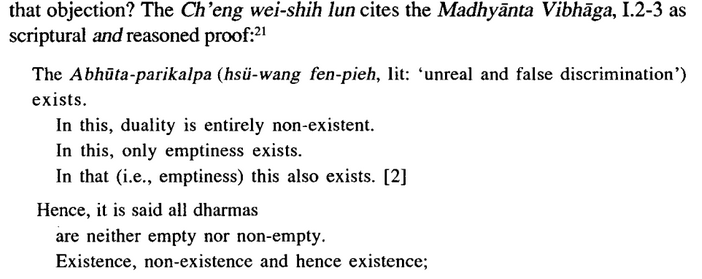Emptiness in mind and in reality
-1
votes
6
answers
363
views
Recent exchange here got me thinking. Nagarjuna's karika, 1.3 (Batchelor)
> Na hi svabhāvo bhāvānāṃ pratyayādiṣu vidyate
>
> Avidyamāne svabhāve parabhāvo na vidyate
>
> The essence of things does not exist in conditions and so on.
>
>If an own thing does not exist, an other thing does not exist.
There is a venerable tradition of different interpretations of Nagarjuna, based on "the two truths".
***Can that phrase be read to mean*** **emptiness does not exist in non-emptiness: if and only if an own thing does not exist in non-emptiness then an other thing does not exist in emptiness**
So the first phrase says that emptiness is empty in the sense that the absence of svabhava does not exist in things. After that, that whenever a self caused thing cannot be found, then there is no other empty thing.
I don't think it's a normal interpretation?
 ----------
For the purposes of my philosophical question elsewhere (a neat argument for karma and rebirth) I have rendered 'empty' to mean 'analytic' and 'non-empty' to mean empirical.
> *Definition of analytic. Of or relating to analysis or analytics
> especially : separating something into component parts or constituent
> elements.*
>*Definition of empirical. Based on, concerned with, or verifiable by observation or experience rather than theory or pure logic.*
----------
For the purposes of my philosophical question elsewhere (a neat argument for karma and rebirth) I have rendered 'empty' to mean 'analytic' and 'non-empty' to mean empirical.
> *Definition of analytic. Of or relating to analysis or analytics
> especially : separating something into component parts or constituent
> elements.*
>*Definition of empirical. Based on, concerned with, or verifiable by observation or experience rather than theory or pure logic.*
 ----------
For the purposes of my philosophical question elsewhere (a neat argument for karma and rebirth) I have rendered 'empty' to mean 'analytic' and 'non-empty' to mean empirical.
> *Definition of analytic. Of or relating to analysis or analytics
> especially : separating something into component parts or constituent
> elements.*
>*Definition of empirical. Based on, concerned with, or verifiable by observation or experience rather than theory or pure logic.*
----------
For the purposes of my philosophical question elsewhere (a neat argument for karma and rebirth) I have rendered 'empty' to mean 'analytic' and 'non-empty' to mean empirical.
> *Definition of analytic. Of or relating to analysis or analytics
> especially : separating something into component parts or constituent
> elements.*
>*Definition of empirical. Based on, concerned with, or verifiable by observation or experience rather than theory or pure logic.*
Asked by user2512
Feb 5, 2020, 03:01 AM
Last activity: Apr 11, 2021, 12:15 PM
Last activity: Apr 11, 2021, 12:15 PM